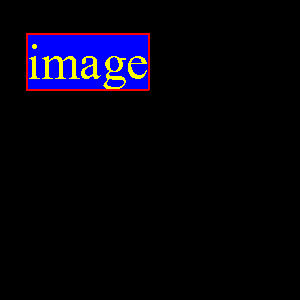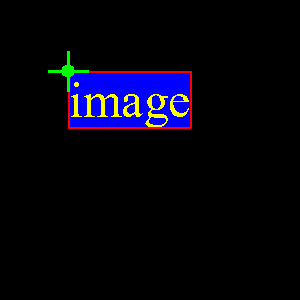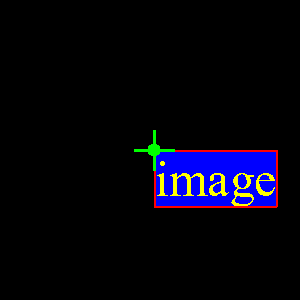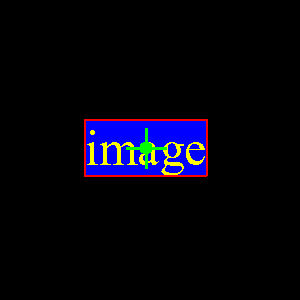如何使用Pygame围绕其中心旋转图像?
我一直在尝试使用pygame.transform.rotate()围绕其中心旋转图像,但它不起作用。具体来说,挂起的部分是rot_image = rot_image.subsurface(rot_rect).copy()。我得到了例外:
ValueError: subsurface rectangle outside surface area
以下是用于旋转图像的代码:
def rot_center(image, angle):
"""rotate an image while keeping its center and size"""
orig_rect = image.get_rect()
rot_image = pygame.transform.rotate(image, angle)
rot_rect = orig_rect.copy()
rot_rect.center = rot_image.get_rect().center
rot_image = rot_image.subsurface(rot_rect).copy()
return rot_image
6 个答案:
答案 0 :(得分:6)
对于以下示例和说明,我将使用由渲染的文本生成的简单图像:
font = pygame.font.SysFont('Times New Roman', 50)
text = font.render('image', False, (255, 255, 0))
image = pygame.Surface((text.get_width()+1, text.get_height()+1))
pygame.draw.rect(image, (0, 0, 255), (1, 1, *text.get_size()))
image.blit(text, (1, 1))
图像(pygame.Surface)可以旋转pygame.transform.rotate。
如果逐步执行此操作,则图像会失真并迅速增加:
while not done:
# [...]
image = pygame.transform.rotate(image, 1)
screen.blit(image, pos)
pygame.display.flip()
这是由于旋转图像的边界矩形始终大于原始图像的边界矩形(某些旋转角度为90度的倍数除外)。
由于多份复印,图像变形。每次旋转都会产生一个小的误差(不准确)。误差的总和正在增加,并且图像会衰减。
可以通过保留原始图像并将“通过单次旋转操作生成的图像“变白”)形成原始图像。
angle = 0
while not done:
# [...]
rotated_image = pygame.transform.rotate(image, angle)
angle += 1
screen.blit(rotated_image, pos)
pygame.display.flip()
现在图像似乎可以任意更改其位置,因为图像的大小随旋转而变化,并且原点始终位于图像边界矩形的左上方。
这可以通过比较旋转之前和旋转之后图像的axis aligned bounding box来补偿。
对于以下数学运算,使用pygame.math.Vector2。请注意,在屏幕坐标中y指向屏幕下方,但是数学y轴指向从底部到顶部。这导致在计算过程中y轴必须“翻转”
使用边界框的四个角点设置列表:
w, h = image.get_size()
box = [pygame.math.Vector2(p) for p in [(0, 0), (w, 0), (w, -h), (0, -h)]]
通过pygame.math.Vector2.rotate将矢量旋转到拐角点:
box_rotate = [p.rotate(angle) for p in box]
获取旋转点的最小值和最大值:
min_box = (min(box_rotate, key=lambda p: p[0])[0], min(box_rotate, key=lambda p: p[1])[1])
max_box = (max(box_rotate, key=lambda p: p[0])[0], max(box_rotate, key=lambda p: p[1])[1])
通过将旋转框的最小值添加到该位置来计算图像左上点的“补偿”原点。对于y坐标,max_box[1]最小,因为沿y轴“翻转”了
origin = (pos[0] + min_box[0], pos[1] - max_box[1])
rotated_image = pygame.transform.rotate(image, angle)
screen.blit(rotated_image, origin)
甚至可以在原始图像上定义枢轴。必须计算枢轴相对于图像左上角的“平移”,并且图像的“ blit”位置必须通过平移进行移位。
定义一个枢轴,例如在图片的中央:
pivot = pygame.math.Vector2(w/2, -h/2)
计算旋转的枢轴的平移:
pivot_rotate = pivot.rotate(angle)
pivot_move = pivot_rotate - pivot
最后计算旋转图像的原点:
origin = (pos[0] + min_box[0] - pivot_move[0], pos[1] - max_box[1] + pivot_move[1])
rotated_image = pygame.transform.rotate(image, angle)
screen.blit(rotated_image, origin)
在以下示例程序中,函数blitRotate执行上述所有步骤,并将旋转后的图像“融合”到表面上。 pos是图像的位置。 originPos是图像上位于pos和枢轴上的点:
import pygame
import pygame.font
pygame.init()
size = (400,400)
screen = pygame.display.set_mode(size)
clock = pygame.time.Clock()
def blitRotate(surf, image, pos, originPos, angle):
# calcaulate the axis aligned bounding box of the rotated image
w, h = image.get_size()
box = [pygame.math.Vector2(p) for p in [(0, 0), (w, 0), (w, -h), (0, -h)]]
box_rotate = [p.rotate(angle) for p in box]
min_box = (min(box_rotate, key=lambda p: p[0])[0], min(box_rotate, key=lambda p: p[1])[1])
max_box = (max(box_rotate, key=lambda p: p[0])[0], max(box_rotate, key=lambda p: p[1])[1])
# calculate the translation of the pivot
pivot = pygame.math.Vector2(originPos[0], -originPos[1])
pivot_rotate = pivot.rotate(angle)
pivot_move = pivot_rotate - pivot
# calculate the upper left origin of the rotated image
origin = (pos[0] - originPos[0] + min_box[0] - pivot_move[0], pos[1] - originPos[1] - max_box[1] + pivot_move[1])
# get a rotated image
rotated_image = pygame.transform.rotate(image, angle)
# rotate and blit the image
surf.blit(rotated_image, origin)
# draw rectangle around the image
pygame.draw.rect (surf, (255, 0, 0), (*origin, *rotated_image.get_size()),2)
font = pygame.font.SysFont('Times New Roman', 50)
text = font.render('image', False, (255, 255, 0))
image = pygame.Surface((text.get_width()+1, text.get_height()+1))
pygame.draw.rect(image, (0, 0, 255), (1, 1, *text.get_size()))
image.blit(text, (1, 1))
w, h = image.get_size()
angle = 0
done = False
while not done:
clock.tick(60)
for event in pygame.event.get():
if event.type == pygame.QUIT:
done = True
elif event.type == pygame.KEYDOWN:
if event.key==pygame.K_ESCAPE:
done = True
pos = (screen.get_width()/2, screen.get_height()/2)
pos = (200, 200)
screen.fill(0)
blitRotate(screen, image, pos, (w/2, h/2), angle)
angle += 1
pygame.draw.line(screen, (0, 255, 0), (pos[0]-20, pos[1]), (pos[0]+20, pos[1]), 3)
pygame.draw.line(screen, (0, 255, 0), (pos[0], pos[1]-20), (pos[0], pos[1]+20), 3)
pygame.draw.circle(screen, (0, 255, 0), pos, 7, 0)
pygame.display.flip()
pygame.quit()
答案 1 :(得分:4)
您正在删除旋转创建的矩形。您需要保留rect ,因为它在旋转时会改变大小。
如果要保留对象位置,请执行:
def rot_center(image, angle):
"""rotate a Surface, maintaining position."""
loc = image.get_rect().center #rot_image is not defined
rot_sprite = pygame.transform.rotate(image, angle)
rot_sprite.get_rect().center = loc
return rot_sprite
# or return tuple: (Surface, Rect)
# return rot_sprite, rot_sprite.get_rect()
答案 2 :(得分:2)
最常见的答案有一些问题:前一个矩形的位置需要在函数中可用,以便我们可以将它分配给新的矩形,例如:
rect = new_image.get_rect(center=rect.center)
在另一个答案中,通过从原始图像创建新的矩形来获得位置,但这意味着它将定位在默认(0,0)坐标处。
以下示例应该可以正常工作。新的rect需要旧rect的center位置,所以我们也将它传递给函数。然后旋转图像,调用get_rect以获得具有正确大小的新rect,并将旧rect的center属性作为center参数传递。最后,将旋转的图像和新的rect作为元组返回,并将其解压缩到主循环中。
import pygame as pg
def rotate(image, rect, angle):
"""Rotate the image while keeping its center."""
# Rotate the original image without modifying it.
new_image = pg.transform.rotate(image, angle)
# Get a new rect with the center of the old rect.
rect = new_image.get_rect(center=rect.center)
return new_image, rect
def main():
clock = pg.time.Clock()
screen = pg.display.set_mode((640, 480))
gray = pg.Color('gray15')
blue = pg.Color('dodgerblue2')
image = pg.Surface((320, 200), pg.SRCALPHA)
pg.draw.polygon(image, blue, ((0, 0), (320, 100), (0, 200)))
# Keep a reference to the original to preserve the image quality.
orig_image = image
rect = image.get_rect(center=(320, 240))
angle = 0
done = False
while not done:
for event in pg.event.get():
if event.type == pg.QUIT:
done = True
angle += 2
image, rect = rotate(orig_image, rect, angle)
screen.fill(gray)
screen.blit(image, rect)
pg.display.flip()
clock.tick(30)
if __name__ == '__main__':
pg.init()
main()
pg.quit()
这是旋转pygame精灵的另一个例子。
import pygame as pg
class Entity(pg.sprite.Sprite):
def __init__(self, pos):
super().__init__()
self.image = pg.Surface((122, 70), pg.SRCALPHA)
pg.draw.polygon(self.image, pg.Color('dodgerblue1'),
((1, 0), (120, 35), (1, 70)))
# A reference to the original image to preserve the quality.
self.orig_image = self.image
self.rect = self.image.get_rect(center=pos)
self.angle = 0
def update(self):
self.angle += 2
self.rotate()
def rotate(self):
"""Rotate the image of the sprite around its center."""
# `rotozoom` usually looks nicer than `rotate`. Pygame's rotation
# functions return new images and don't modify the originals.
self.image = pg.transform.rotozoom(self.orig_image, self.angle, 1)
# Create a new rect with the center of the old rect.
self.rect = self.image.get_rect(center=self.rect.center)
def main():
screen = pg.display.set_mode((640, 480))
clock = pg.time.Clock()
all_sprites = pg.sprite.Group(Entity((320, 240)))
while True:
for event in pg.event.get():
if event.type == pg.QUIT:
return
all_sprites.update()
screen.fill((30, 30, 30))
all_sprites.draw(screen)
pg.display.flip()
clock.tick(30)
if __name__ == '__main__':
pg.init()
main()
pg.quit()
答案 3 :(得分:1)
发现问题:示例效果很好,但宽度和高度需要相同的尺寸。固定图片,它的工作原理。
答案 4 :(得分:1)
在pygame中绘制图像所需的一切
game_display = pygame.display.set_mode((800, 600))
x = 0
y = 0
angle = 0
img = pygame.image.load("resources/image.png")
img = pygame.transform.scale(img, (50, 50)) # image size
def draw_img(self, image, x, y, angle):
rotated_image = pygame.transform.rotate(image, angle)
game_display.blit(rotated_image, rotated_image.get_rect(center=image.get_rect(topleft=(x, y)).center).topleft)
# run this method with your loop
def tick():
draw_img(img, x, y, angle)
答案 5 :(得分:1)
我必须如下修改skrx解决方案,这种方式对我有用。
angle=0
roll = true
while roll:
# clean surface with your background color
gameDisplay.fill(color)
self.image = yourImage
rotate_image = pygame.transform.rotate(self.image, angle)
rect = rotate_image.get_rect()
pos = (((your_surface_width - rect.width)/2),((your_surface_height - rect.height)/2))
gameDisplay.blit(rotate_image,pos)
pygame.display.flip()
angle+=2
if angle == 360:
roll=False
- 我写了这段代码,但我无法理解我的错误
- 我无法从一个代码实例的列表中删除 None 值,但我可以在另一个实例中。为什么它适用于一个细分市场而不适用于另一个细分市场?
- 是否有可能使 loadstring 不可能等于打印?卢阿
- java中的random.expovariate()
- Appscript 通过会议在 Google 日历中发送电子邮件和创建活动
- 为什么我的 Onclick 箭头功能在 React 中不起作用?
- 在此代码中是否有使用“this”的替代方法?
- 在 SQL Server 和 PostgreSQL 上查询,我如何从第一个表获得第二个表的可视化
- 每千个数字得到
- 更新了城市边界 KML 文件的来源?



